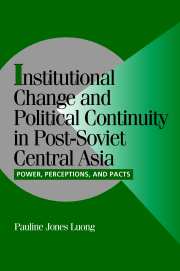Crossref Citations
This Book has been
cited by the following publications. This list is generated based on data provided by Crossref.
Snyder, Richard
2001.
Scaling Down: The Subnational Comparative Method.
Studies in Comparative International Development,
Vol. 36,
Issue. 1,
p.
93.
Way, Lucan A.
2002.
Understanding the role of historical constraint in post-communist development.
Studies in Comparative International Development,
Vol. 37,
Issue. 2,
p.
87.
Fish, M. Steven
2002.
Islam and Authoritarianism.
World Politics,
Vol. 55,
Issue. 1,
p.
4.
Mahoney, James
and
Rueschemeyer, Dietrich
2003.
Comparative Historical Analysis in the Social Sciences.
p.
3.
Bunce, Valerie
2003.
Rethinking Recent Democratization: Lessons from the Postcommunist Experience.
World Politics,
Vol. 55,
Issue. 2,
p.
167.
Walder, Andrew G.
2003.
Elite Opportunity in Transitional Economies.
American Sociological Review,
Vol. 68,
Issue. 6,
p.
899.
Bowring, Bill
2003.
Postcolonial Transitions on the Southern Borders of the Former Soviet Union.
Griffith Law Review,
Vol. 12,
Issue. 2,
p.
238.
Auty, Richard
2003.
Natural resources and ‘gradual’ reform in Uzbekistan and Turkmenistan.
Natural Resources Forum,
Vol. 27,
Issue. 4,
p.
255.
Horne, Cynthia M.
and
Levi, Margaret
2004.
Building a Trustworthy State in Post-Socialist Transition.
p.
52.
Mahoney, James
2004.
Comparative-Historical Methodology.
Annual Review of Sociology,
Vol. 30,
Issue. 1,
p.
81.
Cummings, Sally N.
and
Nørgaard, Ole
2004.
Conceptualising State Capacity: Comparing Kazakhstan and Kyrgyzstan.
Political Studies,
Vol. 52,
Issue. 4,
p.
685.
Jacoby, Wade
2004.
The Enlargement of the European Union and NATO.
Commercio, Michele E.
2004.
The “Pugachev Rebellion” in the Context of Post-Soviet Kazakh Nationalization*.
Nationalities Papers,
Vol. 32,
Issue. 1,
p.
87.
Collins, Kathleen
2004.
The Logic of Clan Politics: Evidence from the Central Asian Trajectories.
World Politics,
Vol. 56,
Issue. 2,
p.
224.
Megoran, Nick
2005.
The Critical Geopolitics of Danger in Uzbekistan and Kyrgyzstan.
Environment and Planning D: Society and Space,
Vol. 23,
Issue. 4,
p.
555.
Herron, Erik S.
and
Mirzashvili, Irakli G.
2005.
The State of Law in the South Caucasus.
p.
20.
Gel'man, Vladimir
2005.
Political Opposition in Russia: A Dying Species?.
Post-Soviet Affairs,
Vol. 21,
Issue. 3,
p.
226.
Hale, Henry E.
2005.
Why Not Parties in Russia?.
Darden, Keith
and
Grzymala-Busse, Anna
2006.
The Great Divide: Literacy, Nationalism, and the Communist Collapse.
World Politics,
Vol. 59,
Issue. 1,
p.
83.
Grzymała-Busse, Anna
2006.
The Discreet Charm of Formal Institutions.
Comparative Political Studies,
Vol. 39,
Issue. 3,
p.
271.





